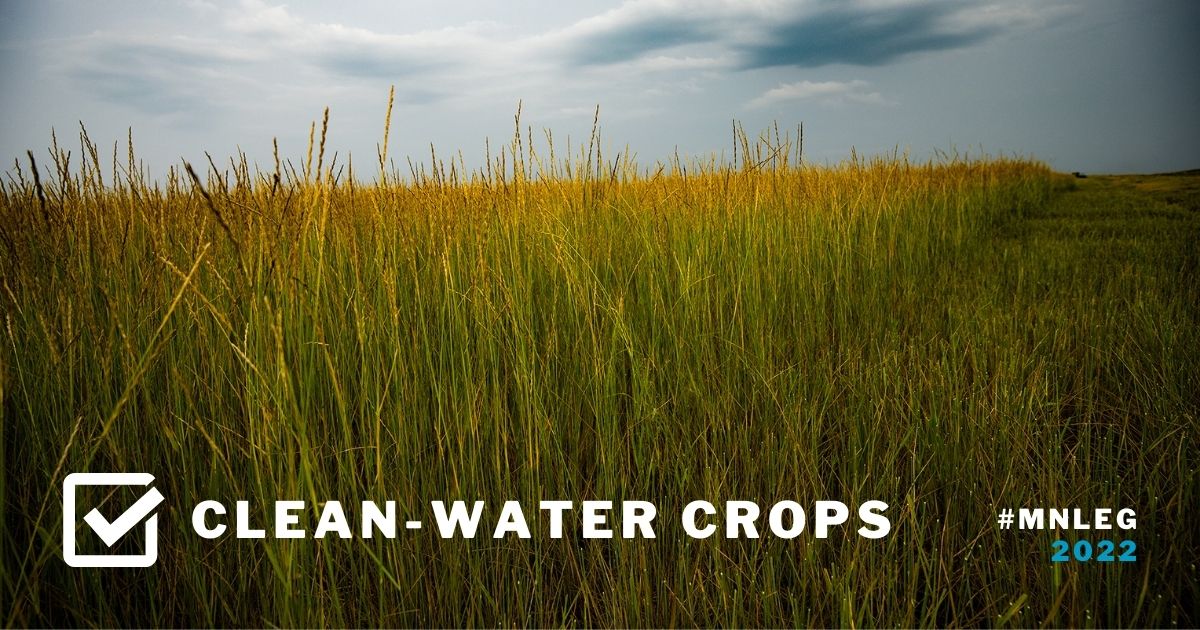Passed: Investments in clean-water crops and their supply chains
In many ways, the conclusion of this year's regular legislative session felt lackluster. Minnesota lawmakers had a $9 billion surplus to invest in our state's future and, to this point, have failed to make the most of this historic opportunity.
There are, thank goodness, a couple of exceptions. The Agriculture "conference" committee report was home to two of FMR's major legislative priorities this year: funding for the continued development of clean-water crops by the University of Minnesota's Forever Green Initiative and a complementary measure to support the local businesses that process, market and distribute these crops.
Thanks in part to a sustained push by FMR River Guardians and our coalition of partners, these bipartisan provisions made it into the final Agriculture package that's now heading to Gov. Tim Walz's desk for his signature. Their inclusion is a victory, if an unnecessarily moderate one, for the environment, water quality and farmers in Minnesota.
Bipartisan funding despite a contentious session
It was gridlock at the Capitol once again, with legislators unable (or unwilling) to push much of anything across the finish line as the clock ticked toward midnight. Fortunately, this didn't extend to clean-water crops.
Building on last year's success, we were able to secure $1.26 million in additional base funding for these programs in the 2022 legislative session. The funding for both of these items was combined into a single budget allocation and included in an Omnibus Policy & Finance bill that combined agriculture, drought and disaster relief and rural broadband investment. The funding begins in the next biennium (2024-2025 state fiscal year). The final package was passed by the House on a 69-64 vote, and in the Senate by a 66-1 vote.
We were also pleased to see that the bill directing 2023 Environment & Natural Resources Trust Fund dollars included $763,000 in funding for Forever Green and $500,000 in additional funding for supply chain development.
This money will bolster the Forever Green Initiative's work to move these clean-water crops from the lab to farm fields across the state, while simultaneously helping to build out the highly anticipated growth of the commercial market. As the New York Times recently wrote, the Forever Green Initiative's work with these crops could turn the Upper Midwest into "the most forward-thinking agricultural region in the country."
Crop science — especially cutting-edge crop science on an accelerated timeline — isn't cheap, but it pays off in the long run for both farmers and the environment. The same is true for the business side, where we're attempting to fast-track the development of supply chains for Kernza perennial grain, camelina oilseeds and more than a dozen other clean-water crops.
Notably, this funding was truly bipartisan. While the final dollar figure is short of what we'd hoped, FMR deeply appreciates the work of numerous legislators who found continuous living cover crops to be a point of agreement in this incredibly contentious year. That includes Sens. Torrey Westrom (R-Elbow Lake), Gary Dahms (R-Redwood Falls) and Gene Dornink (R-Brownsdale); and Reps. Todd Lippert (DFL-Northfield), Ginny Klevorn (DFL-Plymouth), Mike Sundin (DFL-Esko) and Samantha Vang (DFL-Brooklyn Center).
It is also true that without you, our River Guardians and supporters, funding for Forever Green and supply chain businesses could have been left on the cutting room floor alongside so many other important measures. Thank you for your advocacy.
Ultimately, this is another much-needed step forward on our journey to a healthier and more sustainable Minnesota. But it's far from the end.
We need sustained energy, support
While there's been a groundswell of recent press coverage and enthusiasm around Forever Green, that doesn't always translate to immediate institutional support. We need sustained energy, interest and investment to continue the upward trajectory of clean-water continuous living cover crops.
The financial need for those vital programs goes well beyond the $1.26 million allocated by lawmakers this session. In fact, the House plan would have spent more than ten times that figure. The Agriculture conference committee, however, was forced to work within an anemic $7.5 million overall allocation after negotiations by Senate Majority Leader Jeremy Miller (R-Winona), Speaker of the House Melissa Hortman (DFL-Brooklyn Park) and Gov. Walz.
It's frustrating to have clean-water crops — a win-win solution that can benefit Minnesota's farming communities as well as our waters — underfunded during a year with a historic surplus.
But we'll celebrate our advances where we can.
You can help!
Become a River Guardian
Sign up to become a River Guardian, and we'll let you know when important river issues arise. We make it quick and easy to contact decision-makers and make your voice heard. River Guardians are also invited to special events, including happy hours, to learn more about important legislative and metro river corridor issues.
Keep up to date
We write regular Water program and Legislative updates about key environment and water quality issues. You can find them on social media (Facebook and Twitter) and in our e-newsletter, Mississippi Messages.
Photo credit: Dodd Demas for FMR
